Shadow work prompts are prompts used in reflective shadow journaling with the aim of self discovery and inner-child healing. This post covers a list of 100 beginner-friendly shadow work journal prompts for healing, relationships, self love and manifestation.
Page Contents
- What is Shadow Work For Self Healing?
- What are Shadow Feminine traits?
- What causes our Shadow Selves to develop?
- How do I find my Shadow self?
- How do I start doing Shadow Work?
- Does Shadow Work release trauma?
- Shadow Work Prompts For Beginners
- Shadow Work Prompts For Healing
- Shadow Work Prompts For Relationships
- Shadow Work Prompts For Self Love
- Shadow Work Prompts For Trauma
- Shadow Work Prompts For Letting go
- Shadow Work Prompts For Manifestation
- What are the dangers of doing Shadow Work?
- What are the benefits of Shadow Work?
- What is the Shadow Self?
- Carl Jung and the Shadow
- What are the 12 Shadow Archetypes?
- The Self Types
- The Ego Types
- The Soul Types
- What are Shadow Work Exercises?
- What are the examples of Shadow work?
- More Ways On How To Release Your Shadow Self
What is Shadow Work For Self Healing?
Shadow work is a self-healing technique by which a person explores parts of their psyche that they tend to supress, ignore, or deny.
It is a process of accepting and understanding the darker, more difficult aspects of our personality, beliefs, and behaviors, in order to gain insight and understanding of our self and our motivations.
Shadow work can help us to heal from past traumas, rediscover our true selves, uncover hidden potential, and become more whole and authentic.
What are Shadow Feminine traits?
Shadow feminine traits can be seen as the dark side of femininity, though not reserved for only women. It often results from idea that women are seen as weaker, more emotional, and less capable than men.
This notion of viewing vulnerability as a form of weakness can manifest itself in the form of gender inequality, and expectations of women to fit certain roles and stereotypes.
This can lead to feelings of insecurity, confusion, and frustration about what it means to be a woman in society. It can also lead to the objectification of women, the dismissal of their opinions and ideas, and the normalization of violence against women.
Shadow feminine traits can include:
- Self-doubt and insecurity
- Fear of failure and rejection
- Over-sensitivity and excessive emotionality
- Perfectionism and need for control
- Difficulty trusting intuition
- Lack of assertiveness
- Difficulty setting boundaries
- Codependency and people-pleasing
- Unhealthy attachment to the past
- Difficulty expressing emotions
Related: 12 Signs of Unblocked Feminine Energy

What causes our Shadow Selves to develop?
Our shadow self develops as a result of our unconscious mind repressing certain aspects of our personality that we find unacceptable or uncomfortable. This can be due to a variety of factors, such as childhood trauma, societal expectations, or even our own internalized beliefs.
As we grow and develop, these repressed aspects of our personality can become more pronounced, leading to feelings of shame, guilt, and fear.
If you have a repressed shadow you might find that:
- you are prone to chronic dependency on substances or people
- you have a negative self talk and a harsh inner critic
- you have mental health issues like depression, stress and anxiety
- you have superficial relationships and inauthentic career paths
- you don’t have a strong sense of self
How do I find my Shadow self?
The best way to find your shadow self is to explore yourself through self-reflection and meditation.
Try to observe and listen to your inner thoughts and feelings, and pay attention to any aspects of yourself that you may have been trying to ignore or suppress.
You can also try journaling with the shadow work prompts.
Another way to find your shadow self is to pay close attention to your dreams as a way to uncover what is in your subconscious.
Related: 7 Ways To Spot Your Shadow Self
How do I start doing Shadow Work?
To start doing shadow work, first take some time to reflect on yourself and the parts of your life that you may be avoiding or denying.
A good place to start is with this 30 day challenge, do things that take you out of your comfort zone.
Identify any patterns that you notice in yourself and your behaviour while doing things out of your comfort zone.
Then, take some time to explore these thought patterns and behaviours through journalling. Challenge yourself to think about why you may be feel that way.
Finally, you can work with a qualified therapist, to further explore and process these parts of yourself. I highly recommend a therapist as this isn’t the type of deep work you can do successfully on your own.
Does Shadow Work release trauma?
Yes, shadow work can help release trauma. Shadow work is the process of bringing awareness to and acknowledging the parts of ourselves that we may have repressed due to trauma.
By doing the deeper work of uncovering and understanding our trauma, we can gain insight into our behaviour and motivations, and learn how to better respond to our emotions in healthier ways.
When this work is done, you can begin to heal and release the trauma such as shame, guilt, fear, anger, and grief that has been stored in your body, mind, and spirit.
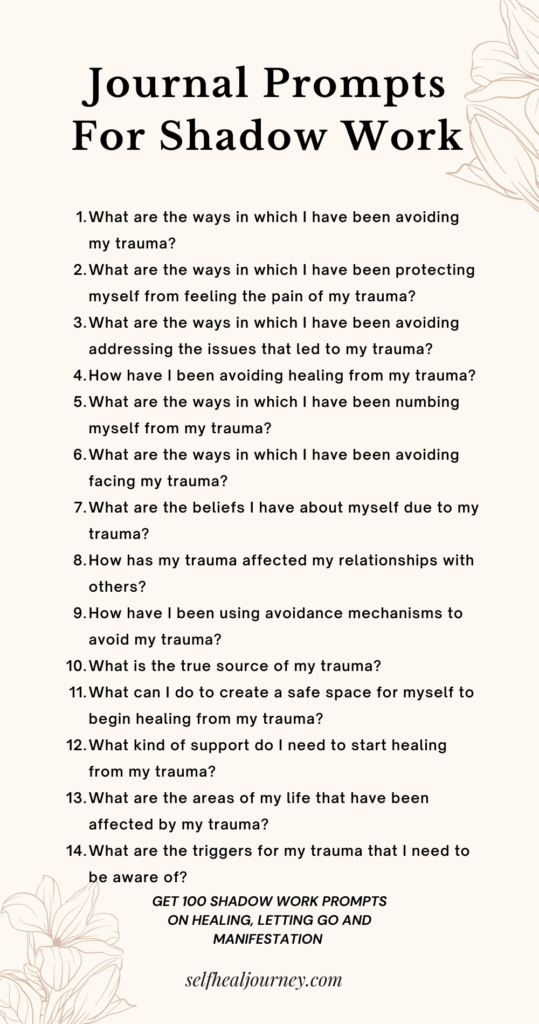
Shadow Work Prompts For Beginners
- What do I need to learn about myself?
- What are my strengths and weaknesses?
- What are my fears and how do they affect me?
- What do I want to accomplish in life?
- What are the areas of my life that need improvement or exploration?
- What past experiences have shaped my beliefs and values?
- How can I use my experiences to develop better habits and attitudes?
- How can I make better decisions?
- What inner wisdom do I need to tap into?
- What self-care activities can I do to nourish my spirit?
Must Read: The Best Shadow Work Journals & Workbooks For Beginners
Shadow Work Prompts For Healing
- Which areas do you tend to self neglect?
- What triggers you to neglect your self care?
- In what ways do you show that you care about yourself?
- What need do you deprive yourself the most? How does it make you feel?
- What personal stories do you have around your worth?
- What message did you get around getting your needs met?
- Would you say you got your needs met as a child? What was missing?
- What in your childhood/past made you feel unworthy?
- Were you able to ask for what you need as a child? What were your caregivers’ reactions?
- How would you respond to your boundaries being crossed? Do you set boundaries? do you speak up or do you prefer to not rock the boat?
- How important is your validation vs what other people think. If something was important to you, would you stop doing it to win others approval?
- What areas are you low effort when it comes to you? What can you do differently?
- How do you feel about womanhood and femininity? Would you say you are in touch with your feminine side? What feelings come up for you when you think of femininity?
- What do you currently struggle with when it comes to putting yourself first and what will you do differently?
- What invalidating words have you heard in the past when you stated a boundary or a concern? Do you treat yourself the same way now? What would you say to your younger self?
- Do you feel as though your needs are important? How do you show this?
- Write down how your caregivers treated you vs How you treat yourself now. Are there any similarities? How do you feel about that?
- Were you raised to take care of everyone else around you? How has this affected you?
- How do you deal with your emotions especially negative ones?
- Write down how your caregivers treated you vs How you treat yourself now. Are there any similarities? How do you feel about that?
- How do you feel about your body? In what ways can you take better care of it?
- Write down your triggers for when you have bad days and write a do list that will cheer you up.
- How can you express your needs clearly with others?
- What kind words can you express about yourself without guilt? Write them down and put them around your space.
- What are the ways you love to be loved and how do you typically give love to others. How would you like your loved ones to support you?
- What does your ideal morning look like?
- How would your authentic self behave vs your people-pleasing self?
- What makes your mental health better? When do you notice a decline in your mental health?
- What is something that you have been procrastinating on and why?
- What scares you the most? What can you do today that scares the crap out of you?
- What are my biggest fears and how can I work through them?
- What false beliefs am I holding onto and how can I challenge them?
- What is the root cause of my anxieties and how can I heal them?
- What is the source of my recent negative behaviour and how can I change it?
- What is the cause of my unhealthy patterns and how can I break them?
- What triggers my feelings of unworthiness and how can I overcome them?
- What are my unresolved issues from the past and how can I heal them?
- What is the source of my inner pain and how can I release it?
- What is the lesson I need to learn from my current struggle and how can I grow from it?
- What is the cause of my self-sabotaging behavior and how can I overcome it?
Shadow Work Prompts For Relationships
- What fears am I holding onto that are preventing me from connecting more deeply with my partner?
- How do I sabotage my relationships?
- What emotions am I avoiding in my relationships?
- What do I need to let go of in order to be more present in my relationship?
- What are my expectations of my partner and how do they limit us?
- What triggers my fear of intimacy?
- How can I accept my partner’s flaws and imperfections?
- What do I need to stop expecting from my partner?
- How can I learn to trust and be vulnerable in my relationships?
- What patterns from my past relationships am I bringing into this one?
- What can I do to become more emotionally available to my partner?
- How can I communicate my feelings without being defensive or blaming?
- What can I do to foster a healthy give-and-take in the relationship?
- How can I break the cycle of criticism and judgment in the relationship?
- How can I show more appreciation and gratitude to my partner?
Must Read: 17 Best Shadow Work Books & Journals for Personal Growth
Shadow Work Prompts For Self Love
- What do I need to do to nurture my own self-love?
- What do I admire about myself?
- What have I learned about myself that I didn’t know before?
- What do I need to forgive myself for?
- What does self-love look like for me?
- What do I need to do to start loving myself more?
- What steps can I take to practice more self-care?
- What are the ways that I can learn to accept myself?
- What is holding me back from loving myself?
- How can I show myself more compassion?
- What would I do if I loved myself unconditionally?
- What would I do differently if I felt more confident in myself?
- How can I start being kinder to myself?
- What do I need to do to start believing in myself?
- What changes do I need to make to start respecting myself?
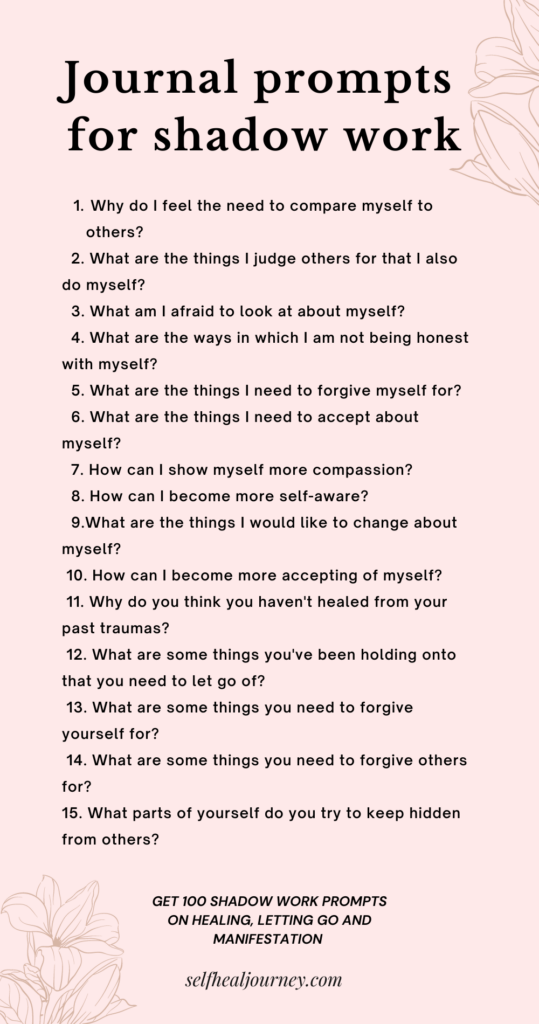
Shadow Work Prompts For Trauma
- What are the ways in which I have been avoiding my trauma?
- What are the ways in which I have been protecting myself from feeling the pain of my trauma?
- What are the ways in which I have been avoiding addressing the issues that led to my trauma?
- How have I been avoiding healing from my trauma?
- What are the ways in which I have been numbing myself from my trauma?
- What are the ways in which I have been avoiding facing my trauma?
- What are the beliefs I have about myself due to my trauma?
- How has my trauma affected my relationships with others?
- How have I been using avoidance mechanisms to avoid my trauma?
- What is the true source of my trauma?
- What can I do to create a safe space for myself to begin healing from my trauma?
- What kind of support do I need to start healing from my trauma?
- What are the areas of my life that have been affected by my trauma?
- What are the triggers for my trauma that I need to be aware of?
- What are the positive changes I can make in my life to help me heal?
Shadow Work Prompts For Letting go
- What in my life do I need to let go of in order to move forward?
- What beliefs do I need to let go of that are holding me back?
- What experiences do I need to let go of in order to heal?
- What emotions do I need to let go of to be free?
- What relationships do I need to let go of in order to be healthy?
- What patterns do I need to let go of to make space for new possibilities?
- What fears do I need to let go of to feel empowered?
- What mental stories do I need to let go of to be present?
- What habits do I need to let go of in order to grow?
- What judgments do I need to let go of to be compassionate?
- What expectations do I need to let go of to be more content?
- What resentments do I need to let go of in order to be at peace?
- What doubts do I need to let go of to trust myself?
- What unhealthy attachments do I need to let go of to be independent?
- What comparisons do I need to let go of to be happy?
Shadow Work Prompts For Manifestation
- What parts of myself am I still denying or resisting?
- How can I cultivate a deeper level of self-love and acceptance?
- What fears am I avoiding, and how can I face them?
- What beliefs am I holding onto that are holding me back from manifesting my desires?
- What patterns of my own behavior have been preventing me from achieving my goals?
- What early childhood experiences are still influencing my adult life?
- What parts of myself do I need to embrace and accept in order to move forward?
- What unhealthy coping mechanisms have been keeping me stuck in the past?
- What do I need to release in order to make space for what I desire?
- How can I use my current circumstances to my advantage?
- What limiting beliefs am I holding onto that are preventing me from manifesting my dreams?
- How can I tap into my inner power and manifest my desired outcome?
- What am I afraid of, and how can I use this fear to help me reach my goals?
- What do I need to learn in order to manifest my desires?
- What steps can I take today to bring my dreams?
- What are the three most important goals that I want to manifest this year?
- What steps will I take to manifest these goals?
- What is the first step I can take to manifest my goals?
- What beliefs do I currently hold that could be holding me back from manifesting my goals?
- How can I shift my thinking to better align with my desired outcomes?
- What is one small action I can take today to contribute to manifesting my goals?
- What resources or support systems do I need to manifest my goals?
- What would my life look like if I was already manifesting my goals?
- What emotions or feelings do I need to cultivate in order to manifest my goals?
- What do I need to let go of in order to make space for my desired manifestations?

What are the dangers of doing Shadow Work?
1. Becoming stuck in the past : The need to do the deeper work to ‘fix’ yourself can lead to rumination about the past and your identity which could prevent you from moving on to something new.
2. Isolation: The time spent working on yourself could lead to you feeling disconnected from others and although, solitude can have positive effects on your life, long term isolation can be detrimental to your mental health.
3. Uncovering painful memories and emotions: Doing shadow work is like opening a can of worms. It is best to be mentally prepared to bring up difficult memories and emotions that may be hard to process.
4. Overwhelming: Shadow work can be quite intense and so it is important that you do take breaks and make time for self care.
5. Unhealthy coping mechanisms: Shadow work can lead to unhealthy coping mechanisms such as substance abuse or self-harm if not done in a safe and healthy way.
What are the benefits of Shadow Work?
1. Increased Self-Awareness: Shadow work helps you to become more aware of your own thoughts, feelings, and behaviours. This increased self-awareness and understanding will also help you make better decisions for yourself because you have a better relationship with self.
2. Improved Relationships: By understanding yourself better you get to understand the world around you better. You are able to communicate clearly based on your needs and wants, therefore you build healthier and stronger relationships.
3. Increased Self-Acceptance: Shadow work encourages you to accept all aspects of yourself, including the parts that may be uncomfortable or difficult to face. This can lead to greater self-acceptance and a more positive outlook on life.
4. Regulate emotions: Shadow work helps you to become more aware of your emotions and how they affect your behaviour. This increased emotional awareness can help you to better regulate difficult emotions and become able to manage your moods throughout the day.
What is the Shadow Self?
The shadow self, according to Carl Jung, is the unconscious part of the psyche that houses repressed ideas, instincts, and emotions. It is often seen as the darker side of our personality, containing qualities and traits that we reject or are ashamed of.
Think of Dr Jekyll and Mr Hyde. Dr. Jekyll represents the good side of one’s personality, but when he transforms into Mr. Hyde, his shadow personality gains dominance over him and wrecks havoc on his life.
The shadow self can manifest itself in both positive and negative ways.
“The shadow goes by many familiar names: the disowned self, the lower self, the dark twin or brother in bible and myth, the double, repressed self, alter ego, id. When we come face-to-face with our darker side, we use metaphors to describe these shadow encounters: meeting our demons, wrestling with the devil, descent to the underworld, dark night of the soul, midlife crisis.”
Connie Zweig, Meeting the Shadow
Carl Jung and the Shadow
Carl Jung is the Psychiatrist famous for coming up with the concept of the Shadow self.
The shadow is the unconscious part of our character that does not align with the ideal version of who we want to be. Jung calls this the Ego ideal.
This divide between the Ego ideal and the Shadow self causes the person to fully reject innate qualities associated with the shadow in both themselves and in others. This can be why we dislike specific traits in others, they can often be a reflection of what we dislike in ourselves.
Jung wrote:
“Unfortunately there can be no doubt that man is, on the whole, less good than he imagines himself or wants to be. Everyone carries a shadow, and the less it is embodied in the individual’s conscious life, the blacker and denser it is. At all counts, it forms an unconscious snag, thwarting our most well-meant intentions.”
Carl Jung
Overtime, the repressed shadow overrides our conscious ego, taking possession of our thoughts, emotions and behaviours, driven to self-destructive behaviours that we tried to desperately avoid.
We can avoid the shadow sabotage by simply acknowledging the light and dark, the good and bad aspects of our personalities and coming to an acceptance of ourselves as a whole and not someone that needs to be perfect.
Related: Self Sabotaging Behaviour – Stop For Good With 5 Simple Steps
What are the 12 Shadow Archetypes?
There are a few different ways to think about the 12 Jungian archetypes, but one way to think of them is as 12 different personality types.
Each archetype has its own strengths and weaknesses, and each person has a unique mix of all 12 archetypes within them. Some people may be more dominant in one archetype than another, and this can give insight into that person’s personality.
The 12 Jungian archetypes can be divided into four main groups: the self, the persona, the shadow, and the anima/animus.
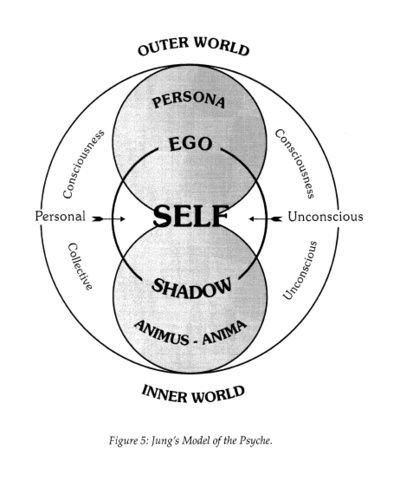
The self is the central archetype, representing our true selves.
The persona is the mask we wear when we are out in the world that protects our ego.
and the shadow is the part of us that we try to keep hidden.
The anima/animus is the part of us that represents the opposite gender.
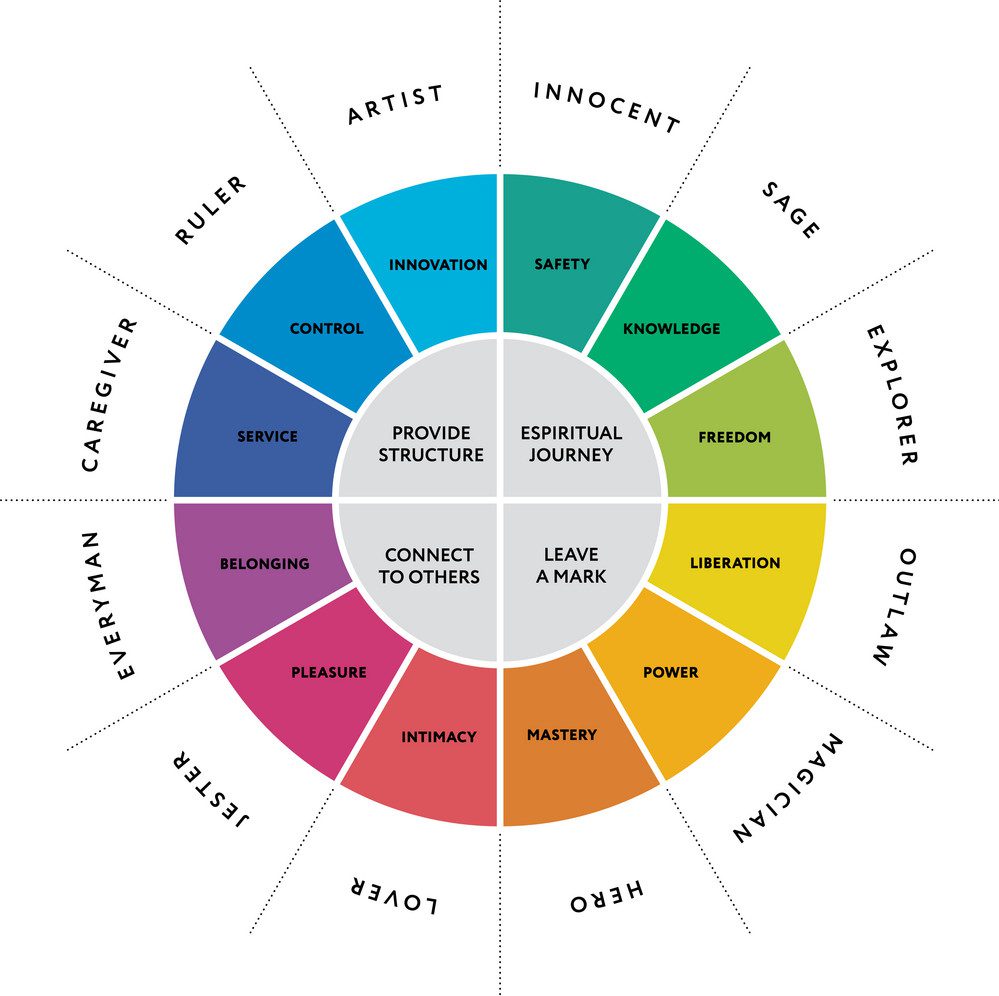
The 12 archetypes are further divided into the 3 sets: The ego, the soul and the self
The Self Types
The Sage: The core desire of the sage is to find the truth. They like to seek out information and knowledge; self-reflect and analyse thought processes to understand the world better.
Often referred to as the scholar, philosopher, academic, detective and the researcher. Their biggest fear is to be misled or seen as ignorant.
The Magician: The core desire of the magician is to understand the fundamental laws of the universe to make their dreams come true. They like to develop a vision and live by it, striving to avoid unintended negative consequences.
Often referred to as the visionary, catalyst, inventor, charismatic leader, shaman, healer, medicine man etc
The Jester: The core desire of the jester is to enjoy living in the moment and have a ‘you only live once’ approach to life. They love to have a great time and lighten up the world with their jokes and funny nature.
Often referred to as the fool, trickster, joker, practical joker, or comedian. Their worst fear is being bored or boring others.
The Ruler: The core desire of the ruler is to control and exercise their power create a prosperous, successful family or community. They do not like chaos or being overthrown and can come off as being authoritative.
Often referred to as boss, leader, queen, king, aristocrat, politician, manager or administrator etc
The Ego Types
The Innocent: The core desire of the innocent is to be happy. Their optimistic nature makes them see the good in everything and everyone. However, their biggest fear is to be punished for doing something bad or wrong so they are prone to people pleasing.
Often referred to as utopian, traditionalist, naive, mystic, saint, romantic, dreamer.
The Hero: The core desire of a hero is to prove their self through courageous acts. They desire to be as strong and competent as possible to save or improve the world
Often referred to as the warrior, crusader, rescuer, superhero, the soldier, dragon slayer, the winner and the team player. Their biggest fear is to be seen as weak, or vulnerable.
The Orphan: The core desire of the orphan is to connect with others and to belong. Their approach is to develop ordinary solid virtues and be down to earth. They hate to be left out or stand out from the crowd so they could risk losing their self in an effort to blend in for the sake of superficial relationships.
Often referred to as the good old boy, regular guy/girl, the person next door, the realist, the working stiff, the solid citizen, the good neighbour, the silent majority.
The Caregiver: The core desire of the caregiver is to protect, help and care for others. They are always doing things for others and would hate to be seen as selfish or unappreciative. Their martyrdom makes them potential candidates for being exploited.
Often referred to as the saint, altruist, parent, helper, supporter.
The Soul Types
The Rebel: The core desire of a rebel to stand up for what they think is right and will go against the law or any figure of authority if it means doing what they believe in. They seek revolution or revenge and will go to the extent of disrupting, destroying, or shocking the system if it means reaching their goals.
Often referred to as the rebel, revolutionary, wild man, the misfit, or iconoclast. Their worst fear is to feel powerless or ineffectual towards their cause.
The Explorer: The core desire of the explorer is to find out more of who they are by experiencing new things and discovering more of the world. Their goal is to live an authentic and fulfilled life. They hate to feel trapped, conform to societal norms and live a life that makes them feel empty.
Often referred to as the seeker, iconoclast, wanderer, individualist, pilgrim.
The Lover: The core desire of a rebel is to have intimacy and experience being in a relationship with people that they love. They try to become more physically and emotionally attractive to avoid being unwanted and unloved, and this desire to please could put them at risk of losing their own identity.
Often referred to as the partner, friend, intimate, enthusiast, spouse, team-builder.
The Creator/Artist: The core desire of the creator is to create things of value. They love to bring their vision to life and their worse fear is having bad ideas or not realising their ideas the way they envisioned it. This archetype is more prone to perfectionism and impractical ideas.
Often referred to as the artist, inventor, innovator, musician, writer or dreamer.
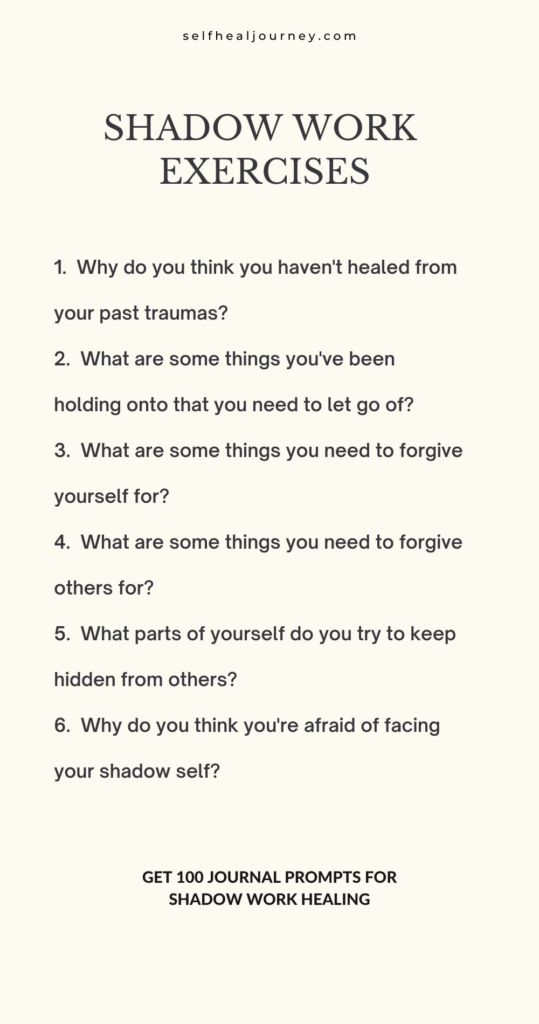
What are Shadow Work Exercises?
Shadow work exercises are activities designed to help individuals explore and understand their unconscious thoughts, feelings, and behaviors.
These exercises can help individuals gain insight into their inner selves and gain a better understanding of how their unconscious mind influences their conscious behavior.
What are the examples of Shadow work exercises?
1. Meditation: Meditation is a great way to become more aware of your inner self and the thoughts and feelings that you may not be consciously aware of. Spend some time each day meditating in order to become more mindful of your inner self.
2. Journaling: Writing down your thoughts and feelings can be a great way to explore your inner self. Take some time each day to write down your thoughts, feelings, and experiences without judgment or censorship.
3. Dream Work: Dreams can provide valuable insight into our unconscious minds and our deepest desires and fears. Spend some time each day analysing your dreams in order to gain insight into what they may be trying to tell you about yourself or the world around you.
4. Therapy: Talking to a professional therapist or counselor is a great way to gain insight into your inner world.
5. Artwork: Creating art can be a powerful way to express and explore your feelings. 6. Yoga: Doing yoga can help you work through physical and energetic blockages.
7. Breathwork: Deep breathing exercises can be a great way to release stuck energy and gain insight into yourself.
More Ways On How To Release Your Shadow Self
1. Visualization: Visualization is a powerful tool for exploring the unconscious mind. Spend some time each day visualizing yourself in different scenarios or situations in order to gain insight into how you might react or behave in those situations.
2. 3-2-1 Shadow Process: The 3-2-1 Process involves addressing your Shadow self first in the 3rd person (it), then in the 2nd person (you) and finally in the 1st person (I).
So, the 3-2-1 process goes like this – imagine first facing the person who triggered a strong emotion in you as an inanimate object, then talking to the person about what you are feeling, and then becoming that person and seeing yourself in that person.
These steps can be summarised as FACE-TALK-BE.
You will find that people are often your mirror and the person you really have an issue with is you.
3. The need to prove yourself: Explore areas of your life where you overextend yourself such as working long hours, oversharing to impress someone, over-giving of yourself to please others.
Evaluate why you are constantly proving yourself. It could be for reasons such as wanting to meet other people’s expectations of you, wanting to be seen as a good, fun, hardworking, successful person, or maybe you want to make people happy etc
List your reasons.
4. On a scale of 1-10: Write down areas in your life that depletes your energy vs areas in your life that energises you.
This will give you an insight on the activities, people and places that are good for you and the things you need to cut back on.
5. Notice your triggers: you can learn a lot about your shadow by being more inquisitive when you are triggered. The triggers are there to bring greater self awareness and can show us vital information about ourselves if we allow it to.
Look for situations where you have a heightened emotions, that constantly have you complaining, or someone or something keeps bringing up strong reactions in you.
Try asking yourself the following questions:
- What specific words, actions, situation, or person caused your reaction?
- How did you react? Consider the physical reaction and the emotions driving your reaction. How did you feel?
- Why? Where have those feelings come from? What do those feelings remind you of?
6. Label your emotions
This can help you to better understand why you are feeling the way you are feeling and to learn how to better manage your emotions in the future. It can also help to identify any underlying issues that may be causing the emotion.
For example, if you are feeling anxious, you can ask yourself if there is something in particular that is causing the anxiety and how you can address it. Sub-emotions of anxiety can include fear, dread, worry, agitation, and panic.
By labelling these emotions, you can be more specific in your understanding of the anxiety and better identify the source of the emotion.
7. Examine your family tree
Make a family tree to decipher generational curses that have been in your family line for decades. Although we are solely responsible for our own actions, there is no doubt that in fact that our actions and behaviour have been shaped by those connected to us.
For example, if you notice that the women in your family tend to neglect their self care, putting everyone’s needs before theirs, and are codependent, find out if you have any of those qualities.
This will also shed a light on any positive traits that have been passed down to us. A family tree can provide us with a way to understand who we are and why we are here and what challenges we need to overcome.
There are many different shadow work exercises available online that can help you explore your unconscious mind further. Try out different exercises until you find one that resonates with you and helps you gain deeper insight into yourself and the world around you.

Hands down, it’s the best article I’ve ever found about shadow work . Priceless . Thank you so much, it’s leading me in the right direction
Wow thanks so much for reading